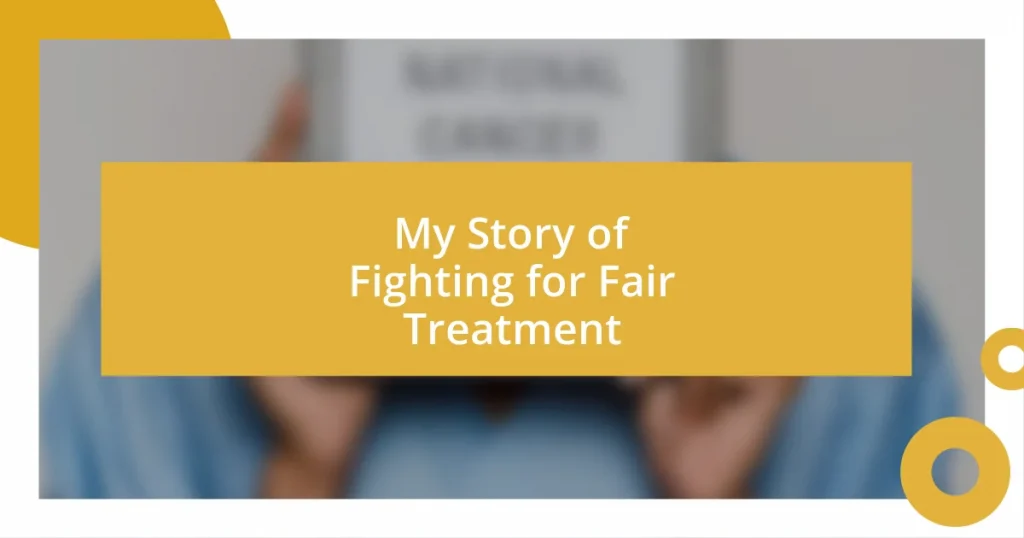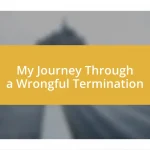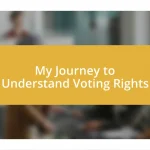Key takeaways:
- Speaking up for a friend highlighted the power of individual voices in advocating for fairness, leading to a sense of community and empowerment.
- Building a supportive network transformed advocacy efforts, fostering collaboration and strong connections among individuals fighting similar battles.
- Effective strategies for change include sharing personal narratives, persistence in the face of setbacks, and understanding legal rights to empower individuals in their fight for fair treatment.
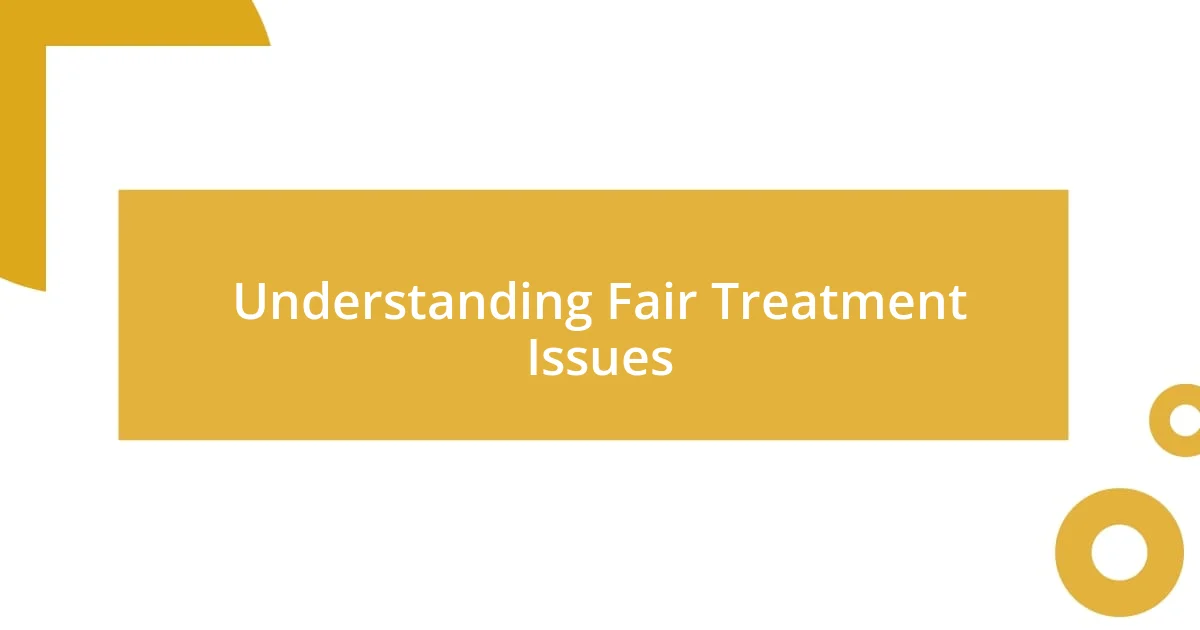
Understanding Fair Treatment Issues
Fair treatment issues often stem from deeply ingrained biases and systemic inequalities. I remember a time when I spoke up about unequal workplace policies, realizing that many around me had experienced similar frustrations but felt powerless to change things. Isn’t it interesting how silence often becomes a shared burden in these situations?
When we talk about fair treatment, it can be helpful to explore the emotional weight of these experiences. I’ve felt that gnawing sense of injustice when I saw a colleague, who consistently performed well, overlooked for a promotion simply due to favoritism. Have you ever felt that sinking feeling in your stomach when you knew something wasn’t right but didn’t know how to articulate it?
Understanding fair treatment also means recognizing the broader impact of our actions on those around us. I’ve seen how my commitment to advocating for fairness not only empowered myself but inspired others to share their stories, too. It begs the question: how many untold stories of struggle are waiting for someone to listen?
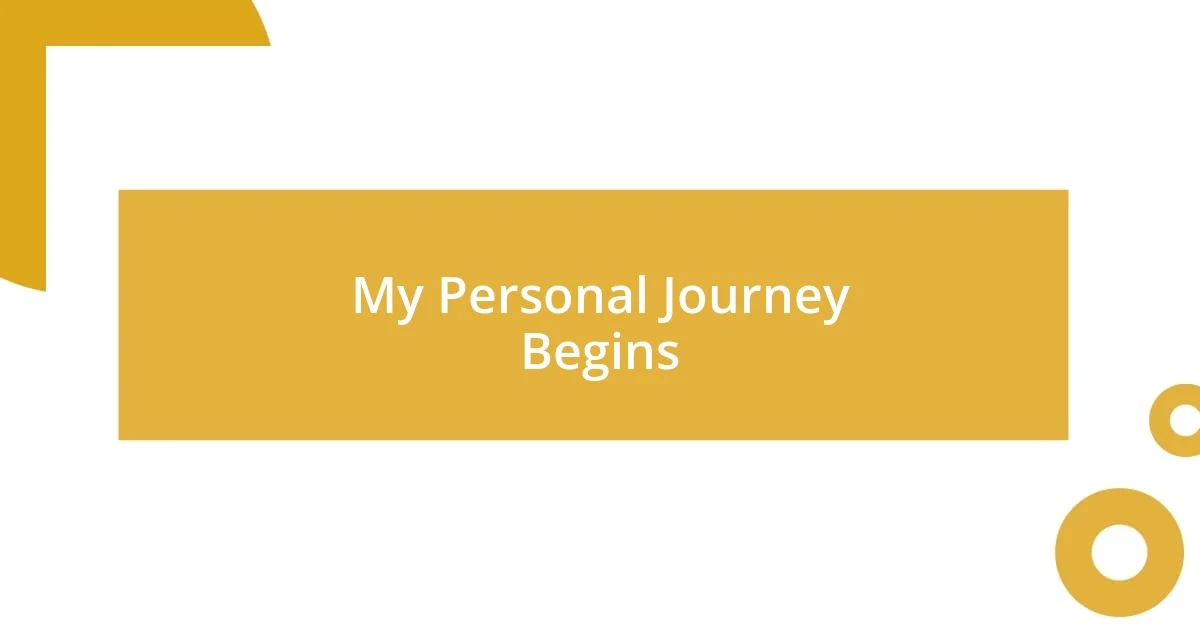
My Personal Journey Begins
My personal journey began with a single thought: I deserved to be heard. One afternoon, as I watched a friend dismissed from a meeting for sharing her ideas, something inside me shifted. I felt a flicker of anger rise within me, compelling me to speak up – not just for her, but for everyone who had ever felt silenced. It was at that moment I realized change starts with a voice, even if it trembles.
As I stepped forward to address the unfairness, I discovered a profound sense of community among those who felt similarly disenfranchised. I recalled a time when I hesitated to join a group advocating for fair treatment, fearing judgment. But once I did, I found warmth in the shared stories, and I could feel the weight of my worries begin to lift.
This journey is ongoing, like climbing a mountain where the vista keeps shifting. I’ve learned that standing up for fairness isn’t just about individual stories; it’s a collective effort that inspires resilience. Each small victory echoes and grows, igniting sparks in others who may not yet realize their power. And reflecting on this, I can’t help but wonder: what more could we achieve together if we truly united our voices?
| Key Moments | Emotions Involved |
|---|---|
| Speaking up for a friend | Empowerment, determination |
| Joining advocacy groups | Relief, camaraderie |
| Realizing the collective strength | Inspiration, hope |
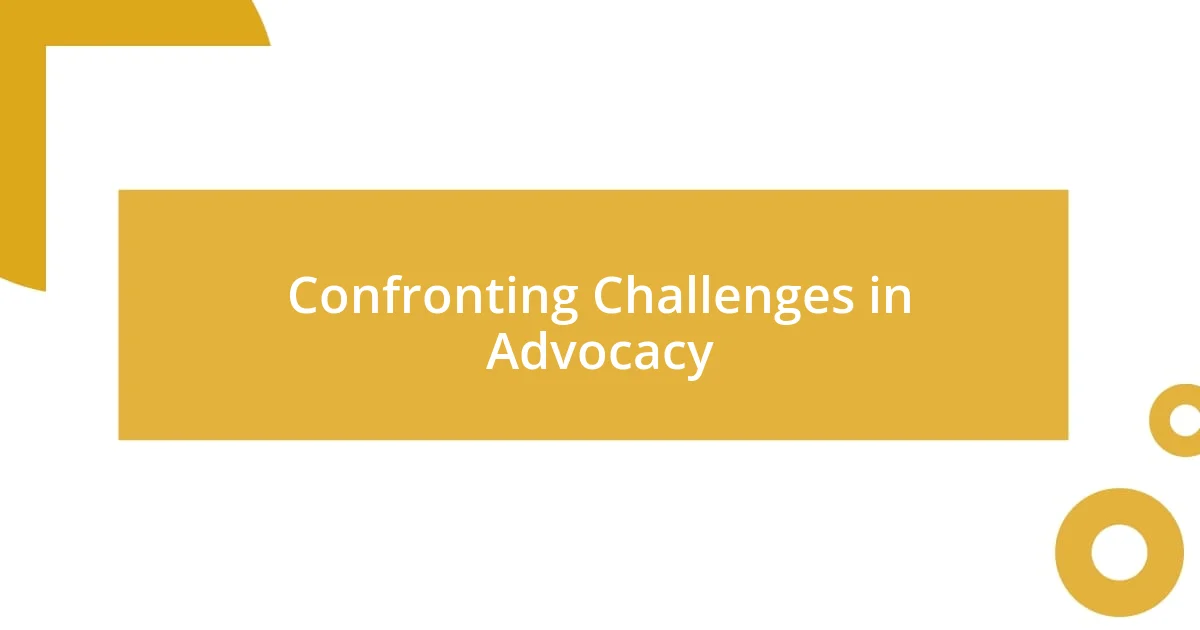
Confronting Challenges in Advocacy
Confronting challenges in advocacy is often a journey fraught with emotional hurdles. I recall a moment when I prepared to address a crucial meeting about inequitable policies. My hands trembled, and my mind raced with doubt. Despite this internal chaos, I pushed myself to speak up. That experience taught me that fear is a part of the process, but it shouldn’t dictate my actions.
As I navigated these challenges, I discovered a few key insights that helped me stay focused and motivated:
- Fear of Repercussions: The worry of backlash is real. I found that sharing my fears with trusted allies eased the burden.
- Resistance from Authority: I faced pushback from those in power, but standing firm in my beliefs became a crucial part of my advocacy.
- Navigating Emotional Burnout: It’s vital to recognize when I felt drained. Taking breaks and seeking support has kept me grounded.
Through each trial, I learned that confronting challenges in advocacy is a testament to resilience. It’s about embracing vulnerability and finding strength in community.
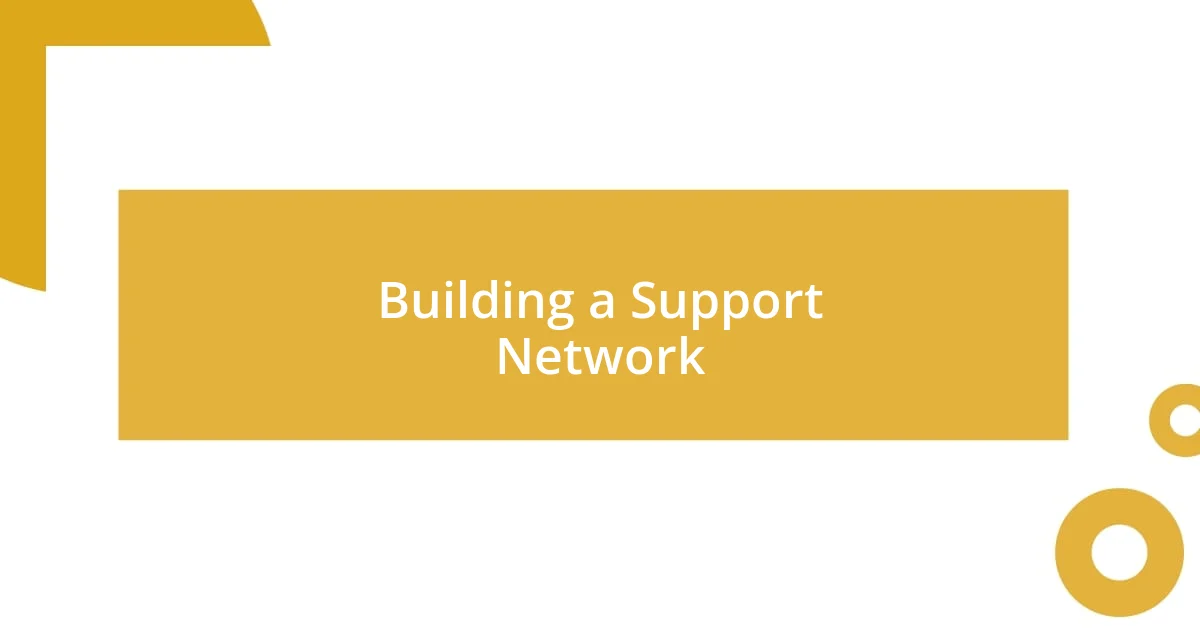
Building a Support Network
Building a support network transformed my advocacy experience in ways I never anticipated. I remember the first time I reached out to others facing similar struggles. The warmth of their acceptance was overwhelming and reminded me I wasn’t alone. It’s fascinating how sharing vulnerabilities can forge bonds stronger than I ever imagined.
I’ve often found that the most meaningful connections come from the unlikeliest places. Once, during a casual conversation at a local coffee shop, I met someone who had been fighting similar battles for years. That chat turned into a regular meet-up, and soon, our two voices became a chorus advocating for change. Doesn’t it strike you how a simple conversation can lay the foundation for robust support?
Establishing this network taught me the immense power of collaboration. We exchanged insights, strategies, and even comfort during setbacks. I often reflect on how essential it is to cultivate these connections. If each of us contributes a small piece of our stories, what might we accomplish collectively? The potential is limitless when we unite and uplift one another.
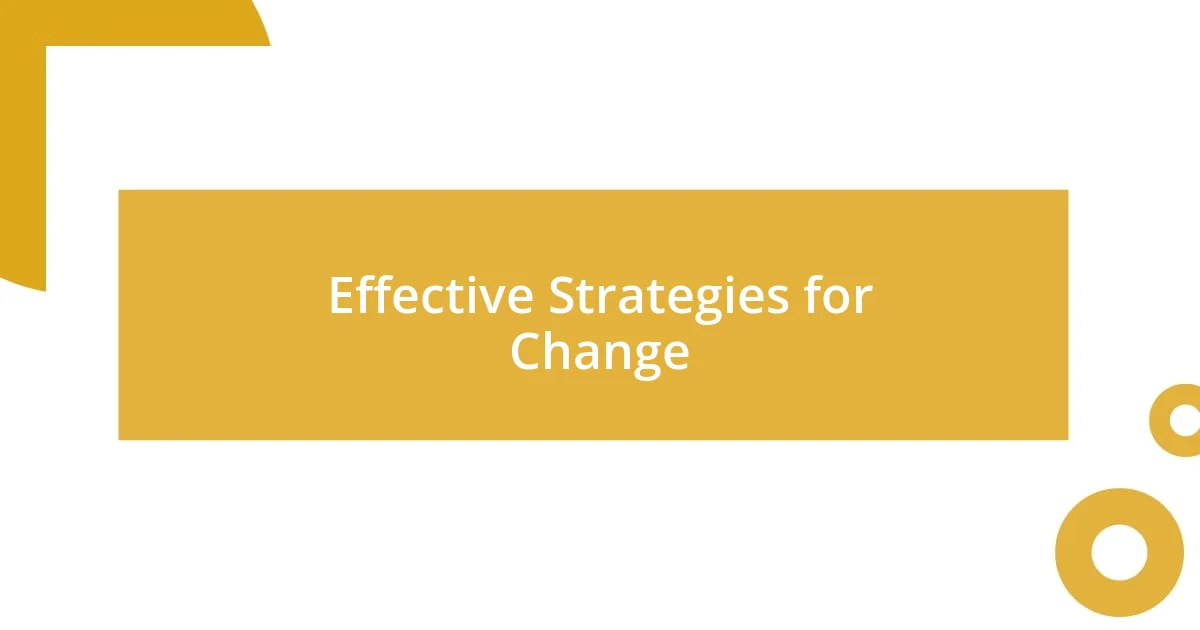
Effective Strategies for Change
Effective strategies for change often stem from a deep understanding of the issue at hand. I remember organizing a small workshop to educate others about the challenges we faced. The room was filled with passionate individuals, and together we brainstormed solutions. It was enlightening to see how sharing knowledge could spark new ideas and strategies that none of us had previously considered. The collective energy was palpable, reminding me that collaboration can lead to innovative solutions.
Another strategy I embraced was storytelling. I vividly recall presenting my own experiences at a community event, feeling a mix of vulnerability and empowerment. When people saw my genuine emotions, it resonated with them. This connection highlighted the power of personal narratives in driving change. How often do we underestimate the impact of simply sharing our experiences? I’ve come to believe that personal stories are catalysts—fostering empathy and a genuine call to action among those who hear them.
Finally, I learned that persistence is key. There was a time when I faced multiple rejections while seeking support for our cause. Each “no” felt like a heavy weight, threatening to silence my resolve. Yet, I found that with each setback, my determination grew stronger. I began to view obstacles as opportunities to refine my approach rather than signs to give up. Have you ever kept pushing against the odds and found unexpected allies along the way? That was my experience, and it taught me that perseverance can open doors when you least expect it.
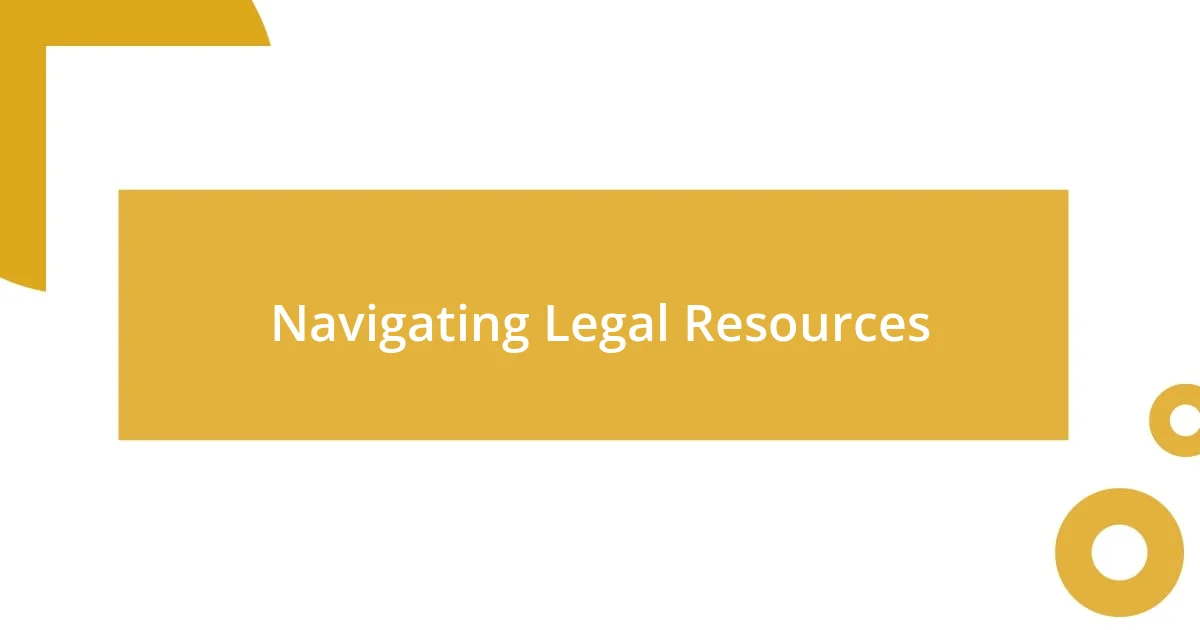
Navigating Legal Resources
Navigating the legal landscape can feel overwhelming, especially when you’re fighting for fair treatment. I can vividly remember the moment I first stepped into a legal aid office, the uncertainty gnawing at me. It was a room filled with books and people whose faces reflected a mix of hope and anxiety. I realized then that these places are more than just offices; they’re havens of knowledge waiting to empower individuals like us.
As I delved deeper into legal resources, I discovered the importance of knowing your rights. There was a time when I felt lost in the legal jargon, but a simple workshop on understanding advocacy laws opened my eyes. It struck me how crucial it is to grasp the language surrounding legal matters—how else can we assert our claims? Engaging with knowledgeable individuals can bolster our confidence and help us craft compelling arguments.
I also learned the value of documenting everything. There was a particular instance when I faced unfair treatment at work and started jotting down every incident, every conversation. Reflecting on that meticulous record later revealed patterns I hadn’t noticed before. It’s incredible how something as simple as documentation can serve as powerful evidence in navigating legal disputes. Have you ever thought about how keeping track of your experiences could influence your case? I can assure you that those records might just be the key to your success.
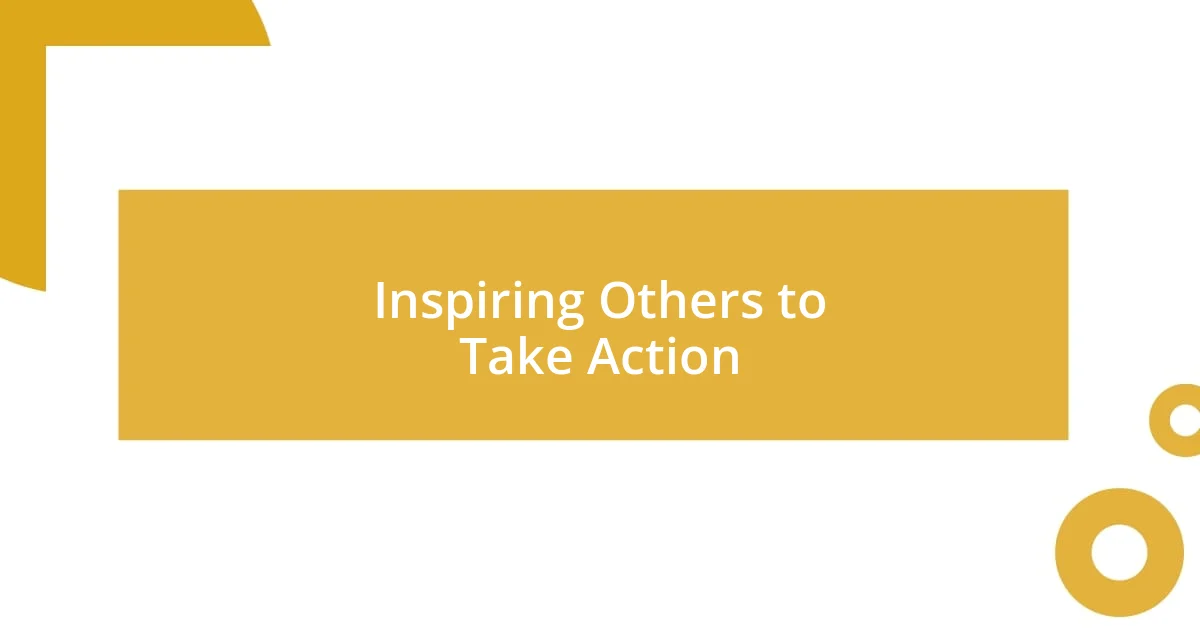
Inspiring Others to Take Action
Inspiring others to take action often starts with leading by example. I vividly recall the moment I decided to approach a local organization to discuss our shared goals. When I walked in with enthusiasm, it sparked a conversation that led to a community rally. Seeing the faces of those who joined felt incredibly rewarding—it was like igniting a fire of purpose among everyone present.
It’s also essential to create a supportive environment where people feel comfortable voicing their concerns. I once organized a listening session at a neighborhood center, inviting anyone to share their stories of unfair treatment. The room was filled with raw emotion; tears were shed and voices trembled with frustration. By simply providing a safe space, we encouraged individuals to share their experiences, turning silent struggles into collective action. Have you ever noticed how much healing can happen when we truly listen to each other?
I believe that sharing tangible success stories can ignite that spark of inspiration, too. Reflecting on a successful initiative we launched together after weeks of planning was exhilarating. It wasn’t merely about reaching our goals; it was about highlighting how individuals coming together can drive change. Seeing the impact we made reminded me that progress can be achieved, and it can motivate others to take that first step. Isn’t it incredible how one success can encourage a ripple effect of courage and determination?









